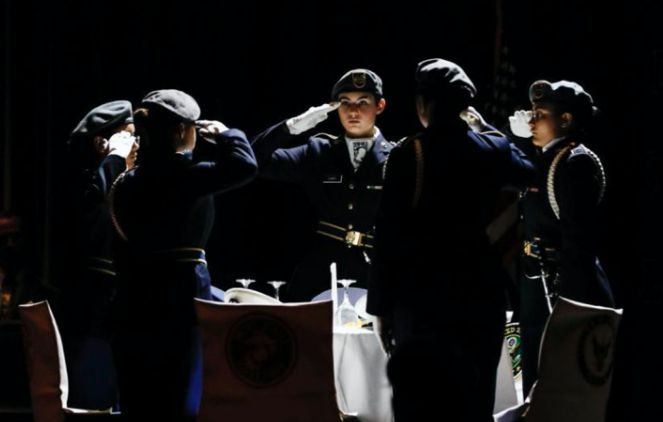Dating back to the passage of the National Defense Act of 1916, the Junior Reserve Officers’ Training Corps (J.R.O.T.C.) has helped develop, educate, and prepare countless American youth.
According to the group’s charter:
“The purpose of Junior Reserve Officers Training Corps is to instill in students in United States secondary educational institutions the value of citizenship, service to the United States, personal responsibility, and a sense of accomplishment.”
In other words – train and raise teens who turn into respectable, honorable, and inspired adults.
Who would oppose such a thing?
As it turns out, more of the ongoing debate over the years hasn’t been so much over the usefulness of the program, but whether or not students should be required to enroll and participate.
Sunday’s New York Times featured a long, front-page story detailing both the pros and cons of the program and practice, specifically the schools where the district requires students to opt out rather than opt into the program:
High school principals who have embraced the program say it motivates students who are struggling, teaches self-discipline to disruptive students and provides those who may feel isolated with a sense of camaraderie. It has found a welcome home in rural areas where the military has deep roots but also in urban centers where educators want to divert students away from drugs or violence and toward what for many can be a promising career or a college scholarship.
And military officials point to research indicating that J.R.O.T.C. students have better attendance and graduation rates, and fewer discipline problems at school.
At the core of the controversy is the finding that many of the schools with the highest participation are those with significant minority populations, leading to accusations that the program unfairly targets black or Hispanic students.
But The New York Times expose turns ironic, especially given the current state of public school wokeness, when it begins to examine some of the more specific complaints surrounding the program.
For example, the author quotes the father of a student who reportedly struggled to opt out of the program. Julio Mejia and his daughter are based in Fort Myers, Fla.
“If she wanted to do it, I would have no problem with it,” he said. “She has no interest in a military career. She has no interest in doing any of that stuff. The only word I can think of is ‘indoctrination.’”
Another critic, Jesús Palafox, suggested the JROTC was “brainwashing” students.
What’s the motto of the program that supposedly attempts to propagandize high schoolers?
I am loyal and patriotic. I am the future of the United States of America. I do not lie, cheat or steal and will always be accountable for my actions and deeds. I will always practice good citizenship and patriotism.
Every student across America would be well served to follow such a mantra.
Other complaints centered on the curriculum that accompanies the program. In fact, The New York Times conducted an independent review of the textbooks and concluded “the books included outdated gender messages, a conservative shading of political issues and accounts of historical events that falsify or downplay the failings of the U.S. government.”
Sylvia McGauley, who used to teach history in Troutdale, Ore., is quoted as saying the books promote “militarism, not critical thinking.” She then added, “The version of history that I was hearing from my J.R.O.T.C. kids was quite different from the versions of history that I tried to teach in my classroom.”
Many parents might applaud these differences, actually.
Public schools across the country are mandating all types of classes these days, many of which offend the moral sensibilities of Christian parents and students. And yet the J.R.O.T.C program is the one The New York Times chooses to challenge and question.
Rick Jahnkow, who apparently has been fighting the J.R.O.T.C. program for over thirty years, actually likened it to “trying to kill a vampire.”
One wonders if Mr. Jahnkow enjoys and appreciates the many benefits of receiving protection from an all-volunteer military, some of whom first went through the high school military training program.
At a time when school violence is alarmingly high and more and more youth are being raised in homes without fathers, what does it say about a culture that would try to run down a noble and principled effort to strengthen its future leaders and emphasize personal responsibility and achievement?
All too often, cultural elites are attacking that which we should be celebrating and questioning what we should be promoting.
Let’s give thanks to all members of the United States military, and particularly those who help to prepare the rising generation through the J.R.O.T.C. program.
Photo Credit: Army JROTC






